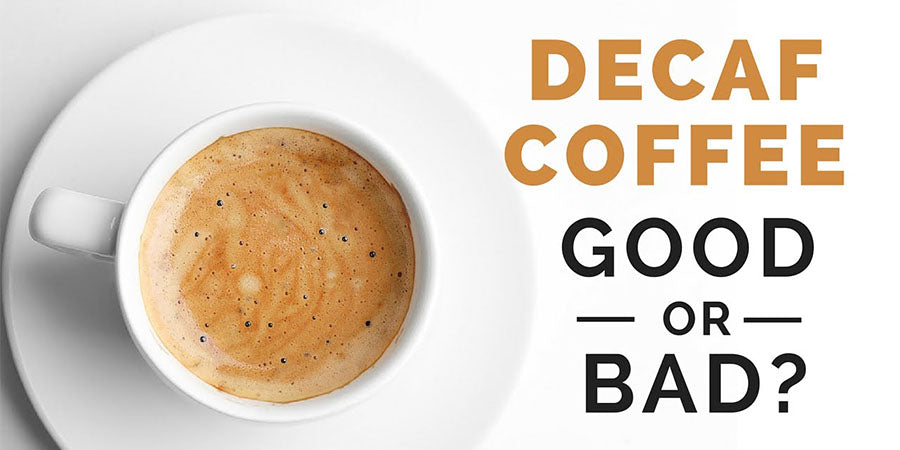Add description, images, menus and links to your mega menu
A column with no settings can be used as a spacer
Link to your collections, sales and even external links
Add up to five columns
Add description, images, menus and links to your mega menu
A column with no settings can be used as a spacer
Link to your collections, sales and even external links
Add up to five columns

Is Decaf Coffee Bad for You?
May 03, 2018 3 min read
Is Decaf Coffee Bad for You?
Decaf Coffee: Is Decaf Coffee Bad for You?
Decaf coffee is a popular alternative for those sensitive to caffeine, but there are lingering questions about its safety and health benefits. This blog explores whether decaf coffee is bad for you, how it’s made, and what health implications it may have.
How is Caffeine Stripped from Coffee?
The journey of decaf coffee began in the early 1900s when German coffee merchant Ludwig Roselius discovered decaf coffee accidentally after a shipment of coffee beans was soaked in seawater. This natural decaffeination led Roselius to patent the first commercial decaffeination process, which initially used benzene, a chemical now known to be harmful.
Today, decaf coffee manufacturers use safer decaffeination methods. However, many still employ potent chemicals, especially in cheaper decaf options. Researchers continue to study whether the decaffeination process affects the coffee’s beneficial compounds.
How is Decaf Coffee Made?
There are three primary methods for decaffeinating coffee:
- Chemical Solvents: This method uses synthetic chemicals like ethyl acetate and methylene chloride. Ethyl acetate is naturally found in some fruits but is typically produced synthetically for decaf coffee. Methylene chloride, used in industrial applications, is controversial due to potential health risks at high doses.
- Liquid Carbon Dioxide (CO2): Considered chemical-free, this method uses liquid CO2 to extract caffeine from coffee beans.
- Water Processes: The Mountain Water Process and Swiss Water Process are popular for maintaining flavor while removing caffeine. These methods are more expensive but avoid chemicals.
How Much Caffeine is in a cup of Decaf Coffee?
Despite decaffeination, decaf coffee still contains small amounts of caffeine. The FDA requires that 97% of caffeine be removed, leaving decaf coffee with 3-12 mg of caffeine per cup.
Does Decaf Coffee Have Risks?
While modern decaffeination methods are safer than those used in the past, there are still concerns about chemical residues. Methylene chloride, for example, can cause health issues if inhaled in large amounts, but the FDA limits its presence in decaf coffee to safe levels. Ethyl acetate is also considered safe in the small amounts used in decaf coffee.
Is Decaf Coffee Healthy?
The safety of decaf coffee largely depends on the decaffeination process. Methods like the Mountain Water Process, Swiss Water Process and liquid CO2 are deemed safest. But beyond safety, does decaf coffee offer the same health benefits as regular coffee?
Studies suggest that decaf coffee can still provide health benefits. A 2014 meta-analysis found that drinking six cups of coffee daily, including decaf, reduced the risk of developing type 2 diabetes. Another study in the Annals of Internal Medicine indicated that decaf coffee drinkers had a slightly lower risk of dying from any cause compared to regular coffee drinkers.
However, these studies highlight that lifestyle choices also play a role, and more research is needed to fully understand decaf coffee health benefits.
How to Choose Decaf Coffee
To minimize exposure to chemicals, choose decaf coffee processed with the Swiss Water or Mountain Water methods. These processes are more transparent and safer. Unfortunately, labeling can be inconsistent, so it's important to research and choose reputable brands.
Conclusion: Is Decaf Coffee Bad for You?
Current evidence suggests that decaf coffee is generally safe and may offer health benefits like regular coffee. For those sensitive to caffeine, switching to decaf coffee can help avoid insomnia, irritability, headaches, nausea, anxiety, jitters, and increased blood pressure. However, it’s important to choose decaf coffee processed with safer methods to minimize any potential risks.
Key Takeaways:
- Decaf coffee is generally safe.
- Choose decaf processed with Swiss Water or Mountain Water methods.
- Decaf coffee still offers many of the health benefits of regular coffee.
By making informed choices, you can enjoy the rich flavors of decaf coffee while reaping its potential health benefits.
Weaver's Coffee & Tea only offers Mountain Water Decaf Coffees.
Decaf Coffee Caffeine & Recipes
How Much Caffeine is in Coffee
How Caffeine Works on the Body
Subscribe
Sign up to get the latest on sales, new releases and more …
